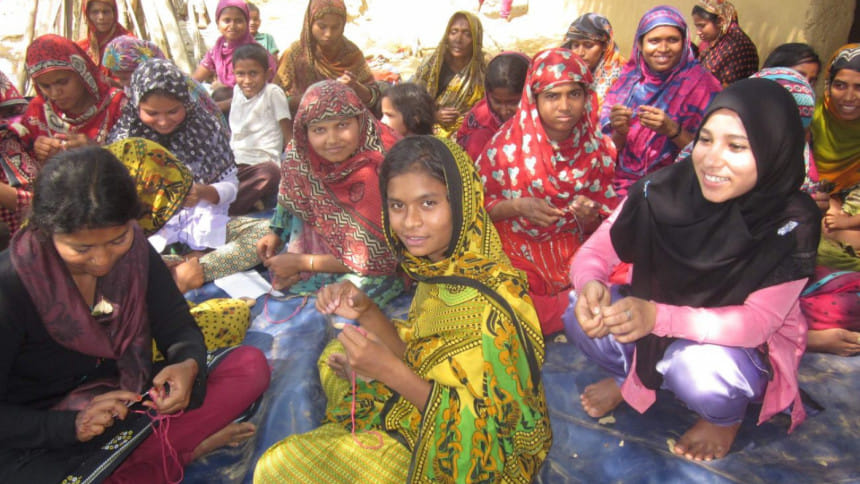Harnessing the Strength of the Octopus in Himchhari

In the hilltop community of Amtoli Para in Himchhari of Cox's Bazar, 20 women from the 70 households are gathered on a mat. With sweeping views down to the beach and across the Bay of Bengal the scene is idyllic, suitable for a picnic if it wasn't quite as hot. Below, along the coast were once their permanent addresses, their homes, shops and gardens. Cows grazed foreshore grasses; goats roamed.
The 1991 cyclone changed all that, proving that a permanent address isn't always permanent. In one respect the villagers were lucky. Although the nearest cyclone shelter was 1.5 kilometres away nobody died; and the worst of the cyclone was destined to be met elsewhere. But crops were ruined; cattle and houses were swept away. With villages destroyed and land no longer inhabitable they turned from the sea.
There was no choice but to move into the sand-rock hills.
Needing new livelihoods the villagers took advantage of the only available resource: the trees of Himchhari National Park. Still today they are primarily wood-cutter families and Nurul Haque, 23, originally of Croalia village, is typical. The father-of-two ventures into the forest four to five days per week, leaving at 9 a.m. to return by mid-afternoon. He walks four kilometres to find trees, hauling fuel wood back to sell in Himchhari that evening or on the following day. He earns a meagre 200 – 400 taka for one day's efforts.
“Wood cutting is painful,” says Ismat Ara Sultana, 20, who, like most of the area's women, pursues the same task as her husband for about half his income, given the smaller loads she can carry and her competing home duties.
It's a livelihood that degrades the national park and has caused the forest to shy away from the coast over the years, exposing the area to even greater erosion risk.
But more recently the village women of Amtoli Para have turned attention back towards an oceanic theme, in the form of crocheting toy octopuses.
From March 2015 the social enterprise Hathay Bunano and the Chittagong-based NGO Community Development Centre, in liaison with relevant government departments and under the auspices of the Climate Resilience Ecosystems and Livelihood project, have begun implementing a new project in the hope of finding sustainable livelihoods for the villagers while better protecting the forest.
The project will teach 28 local women to crochet, with guaranteed buyers of their toy octopuses and other items arranged abroad. Their products will likely find homes in babies' cots in the UK, USA, Australia and South Korea.
“There will be 28 fewer pairs of hands cutting wood,” says Livelihood Facilitator Ruma Majumder, “and that's good news for the forest.” With two months' training, it's hoped each woman may earn up to 4,000 taka per month if she works full-time.
“I like it,” says Sultana, “Yes, there'll be some difficulties in learning the new skill but it will be okay.”
Unfortunately nearby Rohingya households cannot be included for lack of residency rights. They will have no chance to move out of forest harvesting.
With only a non-formal NGO school to rely on, that currently teaches to class 5; in a place where few children study beyond that due to the 25-taka transport cost to the nearest government primary school proving prohibitive, basic entrepreneurial activities come with the hope of improved opportunities, even where the household income rise is modest.
Through crocheting, through harnessing the strength of the toy octopus, Amtoli Para's women are set to better contribute to finally overcoming the multigenerational consequences of the cyclone, to the benefit of their families and the forest.

 For all latest news, follow The Daily Star's Google News channel.
For all latest news, follow The Daily Star's Google News channel. 




Comments